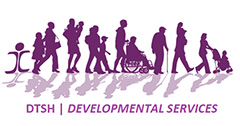After growing up in the small community of Tsawwassen, Scott Fattedad, 32, is familiar with many of the residents and loves nothing more than to chat with them about their day.
So it was a perfect match 11 years ago when Thrifty Foods hired the outgoing Fattedad to help bag groceries and do carry-out.
“It’s fun to work with people. I enjoy working more than sitting around at home with nothing to do,” said Fattedad, who works one day at Thriftys, and another day as a café attendant at Starbucks.
While Fattedad proudly shows off the many “smile pins” he’s earned for exemplary customer service, he’s frequently stopped by shoppers who say hello to him by name before they leave the store.
The fact Fattedad has Down syndrome doesn’t make a difference to his ability to do the job but is noteworthy from an economic and business standpoint.
The picture is even more grim in B.C., which has 18,890 people 19 years and over with a developmental disability; of those, only 2,675 have paid employment. The vast majority of their jobs are part time. A recent B.C. study done by Community Living B.C. reported the average work week of a person with an intellectual disability was 13 hours, and only seven per cent reported working 40 hours or more.
Learn about "Independently Me"
Training youths with developmental disabilities to enter the workforce…
